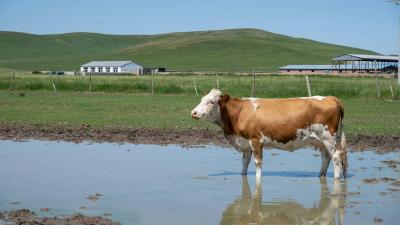Doctors Group Demonstrates on National Mall to Ask Government for ‘Beans Not Beef’ for Health of Planet and People

WASHINGTON—“Beans Not Beef” is the Earth Day message the nonprofit Physicians Committee for Responsible Medicine spelled out with bags of beans on the National Mall. The message coincides with the White House’s climate summit with 40 world leaders, which begins on April 22, Earth Day. The doctors group recently petitioned the White House to update its executive order titled “Tackling the Climate Crisis at Home and Abroad” to recommend policy changes that could help alleviate the climate crisis and improve human health by cutting animal agriculture and promoting a plant-based diet.
Vanita Rahman, MD, with the Barnard Medical Center, Lee Crosby, RD, LD, a dietitian with the Barnard Medical Center and the Physicians Committee, and Zeeshan Ali, PhD, a nutrition program specialist with the Physicians Committee, led the demonstration. Following the demonstration, the beans were donated.
The White House’s executive order creates a National Climate Task Force, which includes Secretary of Agriculture Tom Vilsack. The Physicians Committee’s petition requests that the White House update the executive order to include several directives aimed at the U.S. Department of Agriculture, including adding the climate benefits of a plant-based diet in the 2025-2030 Dietary Guidelines for Americans and proposing a strategy to shift subsidies for meat and dairy products to fruits, vegetables, grains, and beans meant for human consumption.
The Physicians Committee also wrote to the USDA in a letter dated April 20: “I am writing today out of concern for the environment, a concern I know you share. While we are pleased that the Biden administration has already taken initial steps in this important area, the role of dietary contributors to climate change remains neglected,” writes Susan Levin, MS, RD, CSSD, director of nutrition education for the Physicians Committee. “A report published in The Lancet in 2019 concluded that a dietary shift toward plant foods and away from animal products is vital for promoting the health of our planet.”
In 2015, the Dietary Guidelines Advisory Committee recommended a shift away from animal products toward plant-based diets for sustainability. The committee stated that “a dietary pattern that is higher in plant-based foods, such as vegetables, fruits, whole grains, legumes, nuts, and seeds, and lower in animal-based foods is more health promoting and is associated with lesser environmental impact (GHG emissions and energy, land, and water use) than is the current average U.S. diet.”
A recent analysis looked at the dietary guidelines of 85 countries, including the United States, and found that they could be both healthier and more sustainable. The study concluded that, “Providing clearer advice on limiting in most contexts the consumption of animal source foods, in particular beef and dairy, was found to have the greatest potential for increasing the environmental sustainability of dietary guidelines, whereas increasing the intake of whole grains, fruits and vegetables, nuts and seeds, and legumes, reducing the intake of red and processed meat, and highlighting the importance of attaining balanced energy intake and weight levels were associated with most of the additional health benefits.”
Swapping beef for beans could help the United States reach targeted greenhouse gas emission reductions. Researchers compared simulated net emissions of legume production, subtracted those from average beef production rates, and used U.S. reduction goals for 2020 as a reference. Based on the results, legume substitution could account for 46-74% of the required reductions.
According to one climate change calculator, eating 75 grams of beef—a typical fast-food hamburger—daily for a year contributes greenhouse gas emissions equivalent to driving a car 7,196 miles—that’s crossing the United States about 2.5 times. Compare that to eating 150 grams of beans—about a third of a can—daily for a year, which is equivalent to driving a car 93 miles.
Studies show that beans are also beneficial for cardiovascular disease, type 2 diabetes, and weight management, and satisfy hunger more than meat.
Earlier this month, leading scientists, climate change experts, and plant-powered advocates joined together for the Physicians Committee’s free, virtual Plant-Based Climate Summit.
Tell the USDA: Meat Is Fueling the Climate Crisis
Beans Not Beef for the Planet and People
Media Contact
Michael Keevican
202-527-7367
mkeevican[at]pcrm.org
Founded in 1985, the Physicians Committee for Responsible Medicine is a nonprofit organization that promotes preventive medicine, conducts clinical research, and encourages higher standards for ethics and effectiveness in education and research.








